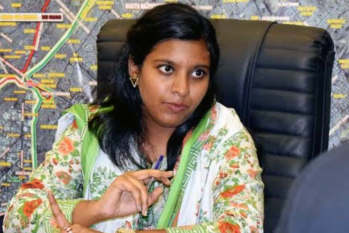
An independent, bipartisan federal body on Tuesday (March 25) recommended the U.S. administration resettle refugees fleeing religious persecution and appoint a Special Envoy for Nigeria to address religious freedom violations.
Announcing its 2025 annual report, the U.S. Commission on International Religious Freedom (USCIRF) urged the administration to resettle persecuted refugees through the U.S. Refugee Admissions Program, a program President Trump has suspended.
USCIRF recommended the administration resettle “refugees who have fled countries with the most egregious forms of religious persecution, in cooperation with like-minded countries and through the U.S. Refugee Admissions Program (USRAP) and other humanitarian protection programs” to help alleviate the crisis of 43.7 million refugees worldwide, “many of whom escaped religious persecution.”
Urging the administration to designate Nigeria as a “Country of Particular Concern” for engaging in or tolerating “particularly severe” violations of religious freedom, the commission recommended appointing a Special Envoy for Nigeria and the Lake Chad Basin “to maximize U.S. diplomatic efforts to address religious freedom violations and atrocity risk in that region.”
USCIRF also recommended the administration promptly fill the posts of Ambassador at Large for International Religious Freedom, Special Adviser to the President on International Religious Freedom on the National Security Council staff and Special Envoy for North Korean Human Rights Issues, among others.
The body urged the administration to review U.S. policy toward countries designated as CPCs but that have waivers keeping any action from being taken as z result – Pakistan, Saudi Arabia, Tajikistan and Turkmenistan.
“Make appropriate policy changes to demonstrate meaningful consequences and encourage positive change, such as lifting existing waivers or not issuing waivers following future CPC designations or redesignations,” the report recommended.
Besides recommending that the administration redesignate as CPCs 12 countries –Burma, China, Cuba, Eritrea, Iran, Nicaragua, North Korea, Pakistan, Russia, Saudi Arabia, Tajikistan, and Turkmenistan – USCIRF urged the designation for Nigeria, Afghanistan, India and Vietnam.
On the State Department’s Special Watch List (SWL) for countries engaging in or tolerating “severe” violations of religious freedom, USCIRF recommended Azerbaijan, Algeria, Egypt, Indonesia, Iraq, Kazakhstan, Kyrgyzstan, Malaysia, Sri Lanka, Syria, Turkey, and Uzbekistan.
In addition, it recommended redesignating as Entities of Particular Concern (EPC) seven non-state actors: Al-Shabaab, Boko Haram, Hay’at Tahrir al-Sham (HTS), the Houthis, Islamic State Sahel Province (ISSP), Islamic State in West Africa Province (ISWAP) (also referred to as ISIS-West Africa) and Jamaat Nasr al-Islam wal Muslimin (JNIM).
In Nigeria last year, federal and state governments continued to tolerate attacks or failed to respond to violent actions by non-state actors who justified their violence on religious grounds, the report noted. These actors include Jama’tu Ahlis Sunna Lidda’awati wal-Jihad (JAS, also known as Boko Haram) and Islamic State West Africa Province (ISWAP).
“Violent Islamist groups and some Fulani militants sought to impose a singular interpretation of Islam on individuals and communities in their areas of operation, regardless of these individuals’ or communities’ own religion or belief,” the report noted. “Security forces sometimes remained slow to respond to violence by these groups, resulting in injury or death for members of targeted religious minority communities.”
Vietnam in 2024 increasingly sought to regulate and control religious affairs through state-sponsored religious organizations, according to the USCIRF report.
“Authorities detained, arrested, imprisoned, and tortured members and advocates of unrecognized religious communities that sought to operate independently of state control,” the body stated.
The Vietnamese government continued to wield the 2018 Law on Belief and Religion (LBR) and its implementing decrees to strictly govern religious affairs, and in March 2024, Decree No. 95/2023/ ND-CP went into effect, replacing two previous implementing decrees – Decree 162 and a punishment decree – which were already restrictive and suppressive, such as mandating that religious groups report personnel and location changes to the government, USCIRF reported.
“This new decree allows authorities to further demand financial records from religious organizations and suspend religious activities for unspecified, vaguely worded ‘serious violations,’” the report stated. “As of December, USCIRF’s Freedom of Religion or Belief (FoRB) Victims List included over 80 prisoners whom the Vietnamese government has punished for their religious activities or religious freedom advocacy.”
Those incarcerated included Y Krec Bya, a Montagnard Protestant missionary of the independent Central Highlands Evangelical Church of Christ (CHECC), sentenced to 13 years in prison.
“In March, preacher Y Bum Bya was found dead after police summoned him to meet after reportedly threatening and beating him,” the body reported. “In September, Dak Lak authorities detained evangelist Y Thinh Nie for repeatedly refusing to join the state-controlled church, and they held a public denunciation in October to pressure more than 20 Montagnard Christians to join the registered church. Unknown assailants reportedly shot two Montagnard pastors in Dak Lak for leading independent church.”
Afghanistan in 2024 saw continued and significant decline in religious freedom under de facto Taliban rule, the report noted.
“The Taliban continued to enforce its strict interpretation of Shari’a throughout the country, directly impacting the religious freedom of all Afghans – including those with differing interpretations of Islam,” USCIRF stated. “Its draconian religious edicts continued to disproportionately target women and girls as well as religious minorities who remain in the country, including Ahmadiyya and Shi’a Muslims, Sikhs, Hindus, and Christians.”
Human rights advocates have increasingly warned of the devastating impact of Taliban rule on these vulnerable communities through its “widespread and systematic” use of physical and sexual violence, especially against women and children, and arbitrary detention, torture and corporal punishment, the report stated.
In August, the Ministry of the Propagation of Virtue and Prevention of Vice (MPVPV) issued a new “morality law,” expanding and reinforcing religious policies for all Afghans, including gender segregation in public spaces. The law grants the ministry broad powers to arrest and detain people perceived to have violated the Taliban’s religious edicts and prevents women from speaking or singing outside of their homes.
“It severely restricts the rights of religious minorities by forbidding all ‘non-Islamic’ religious ceremonies and preventing association with ‘non-believers,’ including Shi’a Muslim and Christian communities,” USCIRF reported. “The law additionally criminalizes wearing or ‘popularizing’ crucifixes, neckties and other ‘un-Islamic’ symbols.”
Taliban authorities resumed using corporal and capital punishment, with punishments including public executions, lashings and floggings, stoning, beatings, and acts of public humiliation such as forced head shaving, the report noted.
In India, attacks and discrimination against religious minorities continued to rise in 2024, the report noted. Prior to national elections in June, Bharatiya Janata Party (BJP) members, including Prime Minister Narendra Modi, propagated hateful rhetoric and disinformation against Muslims and other religious minorities to gather political support.
“Such rhetoric fueled attacks on religious minorities that continued after the election, including vigilante violence, targeted and arbitrary killings, and demolition of property and places of worship,” the report noted. “Authorities continued to exploit anti-terror and financing laws, including the Unlawful Activities Prevention Act (UAPA) and the Foreign Contribution Regulation Act (FCRA), to crack down on civil society organizations and detain members of religious minorities, human rights defenders and journalists reporting on religious freedom.”
The government also replaced its criminal code with new legislation, leaving religious minorities susceptible to targeting if it deemed them as “endangering the sovereignty, unity, and integrity of India,” the report stated.





